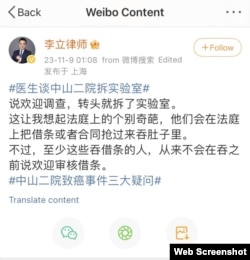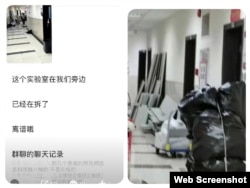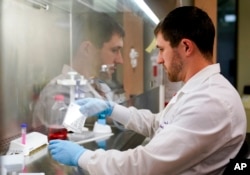The story of three young researchers being simultaneously diagnosed with cancer while working at the same oncology lab has triggered an intense debate and speculation on social media in China. Netizens have been increasingly suspicious about the three physicians at the Sun Yat-Sen Memorial Hospital including two breast surgeons and one visiting scholar, who were diagnosed with cancer in 2023 after studying and working at the Shu Hua Breast Cancer Center lab in Guangzhou, Guangdong province.
The news originated from widely shared screenshots of a WeChat chat history, showing that one of the physicians diagnosed with cancer had been removed from the researchers’ group chat by their advisor.
The news quickly became a trending topic on China's popular social network Weibo, with netizens increasingly suspicious that the researchers’ cancer may be related to the working environment in the lab.
Considered a top-tier medical provider and research institution, the Sun Yat-Sen Memorial Hospital is directly managed by China’s National Health Commission. Most of its laboratories specialize in researching cancer transition and treatment, including cancer epigenetics and gene regulation.
In a November 8 statement the hospital confirmed that three researchers at its Shu Hua Breast Cancer Center lab were diagnosed with cancer in 2023: pancreatic, synovial sarcoma and breast, respectively. The hospital said all three have been treated and are recovering, and that the Center’s laboratory “has strictly adhered to lab safety rules since its launch in 2005.”
“The causes for individual cancer cases are extremely complicated and the hospital welcomed third-party institutions to conduct evaluations and investigations at the lab,” the statement said.
However, Li Li, a lawyer and certified Weibo user with nearly 90K fans, questioned the hospital’s sincerity.
“The hospital said they welcomed any investigation and then subsequently demolished the laboratory.”
That is likely true.
Soon after the hospital issued the statement welcoming any investigation, pictures circulating on Weibo showed that the lab was being dismantled overnight on November 8, sparking public outrage and speculation that the hospital was trying to get rid of evidence.
The hospital confirmed the lab’s partial demolition but claimed it was scheduled prior to the cancer controversy as part of fire prevention plan. The hospital said it was only dismantling storage units for the lab, which it described as unrelated to the ongoing suspicions.
On Weibo, netizens expressed shock and distrust.
One said: “they are trying to delay it, until those physicians pass away, and people forget about it.”
The other asked: “if there’s no problem, why would they demolish the lab now? They are trying to sweep everything under the carpet.”
“Thorough investigation, or quiet cover up?” a third wrote.
On November 9, the China Association for Science and Technology called for an immediate and thorough investigation of the incident.
Even pro-government influencers, like Hu Xijin, former editor-in-chief of state-backed newspaper the Global Times, warned that dismantling the lab during the controversy, invited “further speculation” and confirmed people’s suspicion that the hospital is ‘destroying the evidence.’”
Hu urged the hospital to give a clear and transparent response to the controversy, suggesting holding a press conference and allowing journalists “ask sharp questions and show that the hospital is telling the truth.”
Studies conducted in Sweden and Israel have shown that researchers who routinely handle materials in cancer study labs are at a significantly higher risk of becoming ill with cancer compared with the general public. Such labs must implement strict safety protocols, including by employing advanced ventilation and imposing time limitations for the staff, the studies concluded.
The incident has put a spotlight on lab safety protocols in Chinese hospitals. The Economic Observer, an independent Chinese weekly newspaper, interviewed five medical students in China about their experience with lab safety protocols during their study.
The students said that they had never received formal training on lab safety protocols during their study, and that they’ve picked up safety tips from their advisors and more senior classmates.
“Our safety protocols are limited to wearing gloves and masks. As to why we must wear them and what substances might be harmful to us? We are not sure,” one interviewee who asked to remain anonymous, told the Economic Observer.











